Suivi et évaluation
La plupart des défis liés au suivi et à l’évaluation, comme la quantité insuffisante d’investissements et le manque de capacités, ne sont pas spécifiques à l’assistance monétaire, mais ceux qui le sont concernent principalement le suivi des résultats des transferts non affectés. La flexibilité des transferts monétaires peut compliquer la définition d’indicateurs de résultats appropriés, qui pourraient impliquer un mélange d’indicateurs spécifiques au secteur et transversaux. En parallèle, il existe des limitations au moment de collecter des données précises sur la manière dont les transferts monétaires sont dépensés.
Les signataires du Grand Bargain se sont engagés à garantir que des mécanismes de suivi et d’évaluation pertinents des transferts monétaires soient en place, et à assurer une meilleure compréhension des coûts, avantages, impacts et risques de cette modalité par rapport à d’autres. En partant de cet engagement, le chantier du Grand Bargain sur les transferts monétaires a établi plusieurs points d’action, dont le développement d’indicateurs de résultats communs pour les transferts monétaires à usages multiples, et des indicateurs pour l’analyse de l’optimisation des ressources. L’analyse systématique de l’optimisation des ressources a été rendue difficile par plusieurs facteurs, dont un manque d’approches approuvées, le besoin en données sur les résultats en termes de qualité et le caractère intensif de l’analyse.
Priorités actuelles
Dans le cadre des engagements du chantier du Grand Bargain sur les transferts monétaires, le CALP Network a co-dirigé (avec l’USAID et CRS) la mise au point d’indicateurs de résultats des transferts monétaires à usages multiples. Le projet à tester est actuellement disponible en anglais, espagnol et français, via la bibliothèque.
Initiatives associées
Contenu présenté

Indicateurs de résultats des transferts monétaires à usages multiples : Projet final à tester
Guides et outils
Les indicateurs présentés dans ce document se concentrent sur les principaux objectifs des TMUM humanitaires et sur les résultats auxquels les transferts monétaires à usages multiples peuvent le plus fortement contribuer. (Par exemple, certaines interventions en TMUM visent à relier les personnes aux systèmes de protection sociale après la fin du TMUM; mais nous n’avons pas inclus...

Monitoring 4 CTP: Monitoring Guidance for CTP in Emergencies
Guidelines and Tools
This guidance provides a central resource to promote a common understanding of the most important monitoring considerations for humanitarian projects using cash transfer programming (CTP). The primary audience for this guidance is field-level practitioners, from organisations directly involved in the design, implementation, monitoring, and accountability of projects using cash and vouchers...

Cost-Efficiency Analysis of Basic Needs Programs: Best Practice Guidance for Humanitarian Agencies
Guidelines and Tools
The Efficiency, Effectiveness and Value for Money Sub-Workstream is pleased to share the final output on Cost-Efficiency Analysis of Basic Needs Programs: Best Practice Guidance for Humanitarian Agencies (attached).
Cost-efficiency analysis estimates the ratio of program costs to outputs created, allowing you to compare cost-per-output for programs which all produced the same output. Such...
Thematic lead
Contenu récent

Multi-Purpose Cash Transfer ‘Plus’: Maximizing impact on children through integrated cash-based programming
Report
In 2018, with the support of OFDA and FFP, Save the Children implemented a multi-purpose cash transfer ‘Plus’ program in response to the influx of Venezuelan into Colombia. The program aimed at covering vulnerable household’s basic needs and prevent them from resorting to negative coping strategies,...
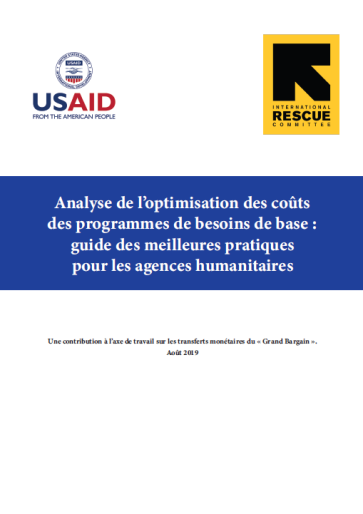
Analyse de l’optimisation des coûts des programmes de besoins de base : guide des meilleures pratiques pour les agences humanitaires
Guides et outils
L’objectif général de cette activité, et de ce document d’orientation en particulier, est « d’améliorer la capacité à réaliser une analyse rigoureuse et cohérente de l’optimisation des coûts dans l’assistance humanitaire ».
Pour ce faire, un document d’orientation technique sera...

How Cash-Based Approaches affect Nutrition Outcomes: Case Studies from World Vision cash programmes in Bangladesh and South Sudan
Report
Case studies South Sudan & Bangladesh – analysis of how different modalities meet their basic needs with flexibility and dignity, esp. contributing to improved nutrition outcomes. Factors such as spending patterns, availability of nutritious food in markets, dietary changes & coping strategies, transfer...

How Cash-Based Approaches Affect Nutrition Outcomes – Guidence Note
Guidelines and Tools
Based on the case studies from South Sudan and Bangladesh, this summary guidance provides advise on use of CVA for improved nutrition outcomes in vulnerable children, emphasising recommendations to ensure that:
– as part of design and targeting, there is improved consideration of nutrition needs in MEB...

The UN Common Cash Platform: What does it mean and how is the IRC responding?
Blog Post
Together our members and partners have strengthened the evidence base and advanced the debate around gender and cash and voucher assistance. Looking ahead, how can we ensure we turn talk into action to deliver quality CVA for everyone?
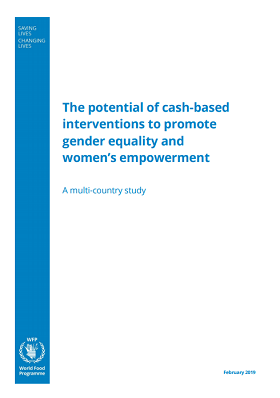
The Potential of Cash-Based Interventions to Promote Gender Equality and Women’s Empowerment
Report
The study on The Potential of Cash-Based Interventions to Promote Gender Equality and Women’s Empowerment sought to explore how CBIs can contribute to achieving gender equality and women’s empowerment (GEWE), as ends in themselves and for food security and nutrition outcomes. Where changes in GEWE...
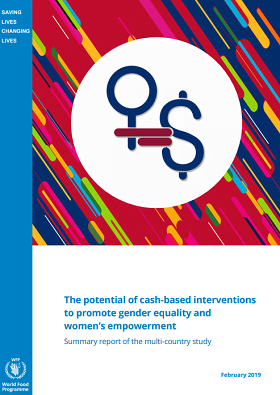
The Potential of Cash-Based Interventions to Promote Gender Equality and Women’s Empowerment – Summary Report of the Multi-Country Study
Report
The study on The Potential of Cash-Based Interventions to Promote Gender Equality and Women’s Empowerment sought to explore how CBIs can contribute to achieving gender equality and women’s empowerment (GEWE), as ends in themselves and for food security and nutrition outcomes. Where changes in GEWE...
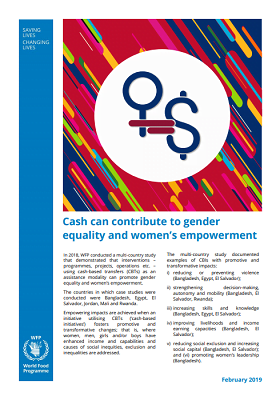
Cash Can Contribute to Gender Equality and Women’s Empowerment
Report
In 2018, WFP conducted a multi-country study that demonstrated that interventions – programmes, projects, operations etc. – using cash-based transfers (CBTs) as an assistance modality can promote gender equality and women’s empowerment. The countries in which case studies were conducted were...
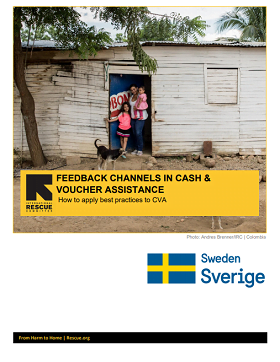
Feedback Channels in Cash and Voucher Assistance: How to Apply Best Practices to CVA
Guidelines and Tools
Accountability is at the core of effective humanitarian programming, and it is our duty to ensure that all programs – including those that use CVA to meet outcomes – are responsive to the clients we serve. While CVA is not inherently more risky than other forms of assistance, there are specific...

Cash Assistance and the Prevention, Mitigation and Response to Sexual and Gender-Based Violence
Report
The study Cash Assistance and the Prevention, Mitigation and Response to Sexual and Gender-Based Violence (SGBV) is based on comprehensive research in Lebanon, Ecuador and Morocco. It provides learning and recommendations when using cash assistance in the prevention, mitigation and response to SGBV. The...

Reflections and recommendations from evaluations of the 2017 CVA Somalia Drought Response
Report
Improving our response to drought to avert crises through the use of cash and voucher assistance requires us to build on experience. This paper pulls together reflections and recommendations from a review of eight evaluation reports, reviews and studies that were conducted during or after the 2017 drought...

6 Key Points to Address: Using Learning to Strengthen Cash and Voucher Assistance in the 2019 Drought Response in Somalia
Report
A summary of learning from Evaluation reports from the 2017 Somalia drought response.
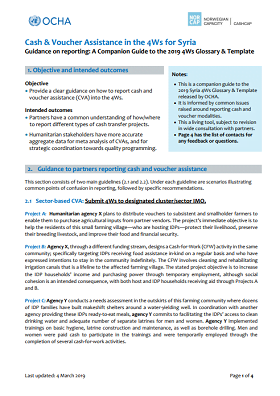
Cash & Voucher Assistance in the 4Ws for Syria Guidance on reporting: A Companion Guide to the 2019 4Ws Glossary & Template
Guidelines and Tools
Objective
• Provide a clear guidance on how to report cash and voucher assistance (CVA) into the 4Ws.
Intended outcomes
• Partners have a common understanding of how/where to report different types of cash transfer projects.
• Humanitarian stakeholders have more accurate aggregate data for meta...
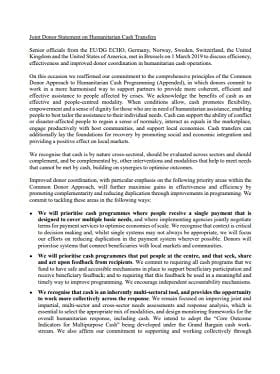
Joint Donor Statement on Humanitarian Cash Transfers
Guidelines and Tools
As part of continuing efforts to strengthen donor coordination on cash, a group of senior officials from major donor agencies (EU/DG ECHO, Germany, Norway, Sweden, Switzerland, the United Kingdom and the United States of America) met in Brussels on 1 March 2019 to discuss shared approaches. Building on...

Rapid Assessment of Markets: World Vision Ecuador
Case Study
Information was collected in 7 cities which were selected because they have the highest Venezuelan population, and there are no other NGOs collecting similar information. Population surveyed corresponds to the Venezuelan population, complemented with interviews conducted in markets and houses where the...
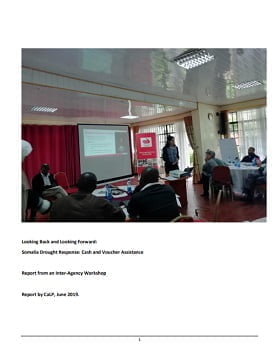
Looking Back and Looking Forward: Somalia Drought Response: Cash and Voucher Assistance
Case Study
This report summarizes the discussions that took place during a one-day learning event on 11th June 2019. The event brought together 27 people from national and international NGOs, the UN, and donors to discuss progress, reflect on cash and voucher (CVA) assistance in Somalia and identify priorities for...

The Gendered Dimension of Multi-Purpose Cash Supporting Disaster Resilience
Report
In 2017, in response to the mounting humanitarian crisis in Yemen, CARE Yemen and Action Contra la Faim (ACF) implemented a cash transfer program and community asset rehabilitation and skill building programing in the governorates of Abyan and Amran. This European Union (EU)-funded program integrated...
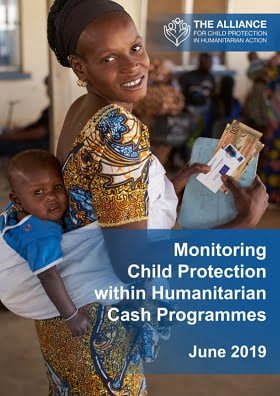
Monitoring Child Protection within Humanitarian Cash Programmes
Guidelines and Tools
This paper summarises findings from an initial scoping study, which seeks to review how child protection outcomes are captured when monitoring multi-purpose humanitarian cash programmes. The study intends to inform the development and piloting of new approaches to integrating child protection concerns...

Analyse des dynamiques sociales et des pouvoirs des parties prenantes pour la mise en place de Transferts Monétaires à Usage Multiple (TMUM) pluriannuels au Nord Mali
Rapport
Six ONG internationales (Action contre la Faim, Danish Refugee Council, Handicap International, International Rescue Committee, Oxfam et Solidarités International) ont mis en place un programme de transferts monétaires à usage multiple au Mali ; la deuxième phase de cette intervention de filets...
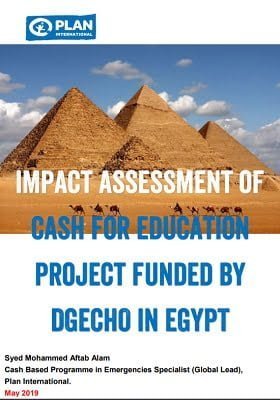
Impact Assessment for Cash for Education Project funded by DGECHO in Egypt
Report
The overall objectives of the Impact assessment were: To measure the impact of cash on the girls and boys by DGECHO funded project. To measure the impact of cash on Education and protection through a gender lens to investigate considerations of power dynamics in the households Understand the good...
